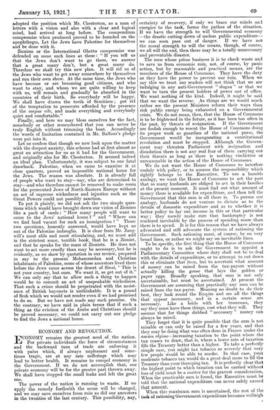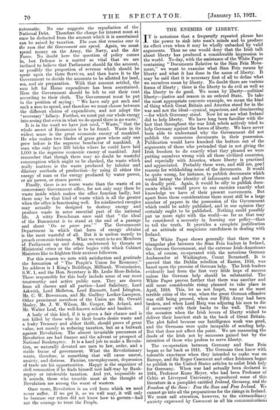ECONOMY AND REVOLUTION.
ECONOMY remains the greatest need of the nation. For private individuals the force of circumstances and the backward turn of trade are enforcing it with pains which, if always unpleasant and some- times tragic, are at any rate sufferings which may lead to better health. It remains to compel economy in the Government. If we do not accomplish that, our private economy will be for the greater part thrown away. We shall have stopped the small leaks and left the great one.
The power of the nation is running to waste. If we apply the remedy forthwith the scene will be changed, and we may save ourselves from ruin as did our ancestors in the twenties of the last century. This possibility, nay, certainty of recovery, if only we brace our minds and energies to the task, forms the pathos of the situation. If we have the strength to will Governmental economy —the drastic cutting down of useless public expenditure— we can soon pass out of danger. If we have nob the moral strength to will the means, though, of course, we all will the end, then there may be a totally unnecessary and preventable disaster.
The men whose prime business it is to check waste and to save us from economic ruin, not, of course, by panic action, but by reasonable and practical means, are the members of the House of Commons. They have the duty as they have the power to prevent our ruin. When we say this we trust our readers will not think that we are indulging in any anti-Government " slogan " or that we want to turn the present holders of power out of office. We want nothing of the kind. Indeed, it might be said that we want the reverse. As things are we would much rather see the present Ministers reform their ways than risk public energy being exhausted on a Governmental crisis. We do not mean, then, that the House of Commons is to be frightened in the future, as it has been too often in the past, by threats of resignation. If the Government are foolish enough to resent the House of Commons doing its proper work as guardian of the national purse, the Government would be inaugurating a constitutional revolution and must be stopped. Although the Govern- ment may threaten Parliament with resignation and dissolution there is not any real fear of them carrying out their threats as long as there is nothing vindictive or unreasonable in the action of the House of °Commons.
We do not want the House of Commons to interfere unduly with policy, or to assume the responsibility which rightly belongs to the Executive. To use a humble analogy, we want the House of Commons to act the part that so many husbands are obliged to act in their families at the present moment. It must find out what amount of money there is available for expenditure, and then tell the Government that this sum is all there is. To pursue our analogy, husbands do not venture to dictate as to the details of domestic expenditure and as to whether it is better policy to lay out income in this or that particular way ; they merely make sure that bankruptcy is not rendered inevitable by the process of spending more than there is to spend. It is for this reason that we have always advocated and still advocate the system of rationing the Government. Such rationing must, of course, be on very broad lines, or rather we might say on inevitable lines.
To be specific, the first thing that the House of Commons ought to do is to ask the Government to appoint a Parliamentary Committee whose duty shall not be to deal with the details of expenditure, or to attempt to cut down this or eliminate that item, but to ascertain what amount of money can be raised from the tax-payers without actually killing the goose that lays the golden or paper eggs. Broadly speaking, that sum is not only ascertainable, but must be ascertained. At present the Government are assuming that practically any sum can be raised from the tax-payer. Meaning no doubt to do their best, they look round the Empire and see all the things that appear necessary, and in a certain sense are necessary. Like a bride with her trousseau, they say they must have these things, cost what they will. They assume that for things dubbed " necessary ' money can always be raised. They forget that it is quite possible that the sum is not raisable or can only be raised for a few years, and that they may be doing what was often done in France under the (mien regime—increasing taxation to the point where the tax ceases to draw, that is, where a lower rate of taxation fills the Treasury better than a higher. To take a perfectly simple case, you might tax tobacco so severely that very few people would be able to smoke. In that case, your moderate tobacco tax would do a great deal more to fill the Treasury than your thumping tax. It is perfectly clear that the highest point to which taxation can be carried without loss of yield must be a matter for the gravest consideration, When the practicable sum is found, the Executive must be told that the national expenditure can never safely exceed that amount.
When this maximum sum is ascertained, the rest of the task of rationing Government expenditure becomes wellnigh automatic. No one suggests the repudiation of the National Debt. Therefore the charge for interest must at once be deducted from the amount which it is ascertained van be raised by taxation. The sum that remains over is the sum that the Government can spend. Again, we must spend money on the Army, the Navy, and the Air Force. No doubt here the question of policy comes in, but Defence is a matter so vital that we are inclined to believe that Parliament should fix the amount, or possibly the proportion of revenue which should be spent upon the three Servi?es, and then leave it to the Government to decide the amounts to be allotted for land, sea, and air preparation. With that amount settled, the sum left for Home expenditure has been ascertained.
Here the Government should be left to cut their coat according to their cloth. The Government must be put in the position of saying : " We have only got such and such a sum to spend, and therefore we must choose between the different claims of expenditure, and not adopt the ' necessary ' fallacy. Further, we must put our whole energy into seeing that even in what we do spend there is no waste."
It is in the word we have just used, " Waste," that the whole secret of Economics is to be found. Waste in its widest sense is the great economic enemy of mankind. He who makes two blades of grass grow where only one grew before is the supreme benefactor of mankind. A man who only lays 350 bricks where he could have laid 1,000 is the supreme economic enemy of mankind. And remember that though there may no doubt be wasteful consumption which ought to be checked, the waste which really matters is the waste produced by inferior and dilatory methods of production—by using ill either the energy of man or the energy produced by water power, or air power, or steam power. Finally, there is. no worse waste than the waste of an unnecessary Government office, for not only may there be waste inside which makes the office function badly, but there may be that kind of waste which is all the greater when the office is functioning well. Its misdirected energies may actually be designed to destroy energy and produce waste in some essential part of the national life. A witty Frenchman once said that " the ideal of the Bureaucrat is to stand at the end of a passage and shout ' On ne passe pas.' " The Government Department in which that form of energy obtains is the most wasteful of all. But it is useless merely to preach economic truisms. What we want is to see Members of Parliament up and doing, undeterred by threats or Ministerial crises or the other bogies with which Cabinet Ministers like to frighten their anxious followers.
For this reason we note with satisfaction and gratitude the formation of " The People's Union for Economy."
Its address is 1 King's Buildings, Millbank, Westminster, S.W. 1, and the Hon. Secretary is Mr. Leslie Hore-Belisha. Those responsible for this body include some of our most trustworthy and active public men. They are drawn from all classes and all parties—Lord Salisbury, Lord Askwith, Lord Midleton, Lord Emmott, Lord Islington, Mr. C. W. Bowerman, and Mr. Godfrey Locker-Lampson. Other prominent members of the Union are Mr. Oswald Mosley, Mr. J. W. Wilson, Mr. Cooper, Mr. Acland, and Mr. Walter Leaf, the well-known scholar and banker.
A body of this kind, if it is given a fair chance and is not killed by those who in their hearts desire waste and a leaky Treasury and abhor thrift, should prove of great value, not merely in reducing taxation, but as a bulwark against Revolution. The almost invariable precursors of Revolution are bad finance and the advent or prospect of National Bankruptcy. It is a hard job to make a Revolu- tion, so naturally devoted are men to law, order, and a stable frame of government. What the Revolutionary wants, therefore, is something that will cause unrest, anxiety, and distress. Famine, unemployment, depression of trade are his opportunities. Happy is the organizer of civil commotion if he finds himself met half-way by Bank- ruptcy or intolerable taxation. And yet, impossible as it sounds, those who tremble most at the thought of Revolution are among the worst of wasters.
Once more, Revolution is an evil from which we need never suffer. If we get it, as we well may, it will only be because our rulers did not know how to govern—had not the courage to trust the People.































 Previous page
Previous page